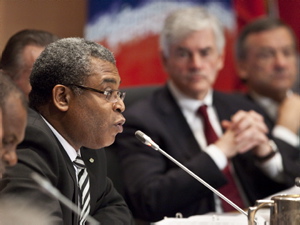Canadian PM: Haiti Recovery Will Take a Decade

Canadian Prime Minister Stephen Harper said on Monday that recovery work for Haiti will probably span more than a decade and that funds committed to the effort must be spent effectively.
"It is not an exaggeration to say that 10 years of hard work awaits the world in Haiti," Harper said to a group of government and NGO representatives gathered in Montreal.
"We must ensure that every resource committed - every relief worker, every vehicle, every dollar - is used as effectively as possible."
Organized by Canadian Foreign Affairs Minister Lawrence Cannon, the Montreal gathering was the first of its kind following the Jan. 12 quake and was held to establish plans for Haiti's long term recovery.
"We come together to support our friends the Haitian people as they seek a new and better future for a country that has already suffered more than we can imagine," said Cannon, who expects a larger international conference to be held in the coming months.
A weighty topic of discussion at the meeting was the cancellation of Haiti's near $1 billion foreign debt – a move that has garnered growing support as recovery efforts continue.
"We hope that you use the weight of your governments to convince international financial institutions to cancel Haiti's entire foreign debt," Eric Faustin, director of the Rocahd, the Coalition of Canadian-Haitian Development Organizations, told the officials gathered.
Nearly $215 million worth Haiti's debt towards members of the Paris Club - including the U.S., Canada, Britain and France - has been slated for cancellation since last July, with officials saying that they will work on speeding up the process.
Taiwan, which is Haiti's second largest bilateral lender, announced last week that they will make the "necessary reviews" to cancel its $90 million loan to the Caribbean nation.
Haiti's other large creditors include the InterAmerican Development Bank, which is owed nearly $440 million, and the government of Venezuela, which is owed $295 million.
Speaking at the Montreal gathering, Haitian Prime Minister Jean-Max Bellerive said that his country is prepared to lead in the recovery efforts, but will continue to require "massive support" from the global community.
"We have to do more with less," Bellerive said. "Throughout history our people have been marked by tragedy and catastrophe. Each and every time, it got back on its feet and made an attempt at reconstruction and this is what we will do now."
"The Haitian government is working in precarious conditions but it can provide the leadership that people expect," he added.
Officials from the International Monetary Fund (IMF) have said that a strategy comparable to the Marshall Plan is needed to ensure full recovery in Haiti.
"My belief is that Haiti - which has been incredibly hit by different things - the food and fuel prices crisis, then the hurricane, then the earthquake - needs something that is big. Not only a piecemeal approach, but something which is much bigger to deal with the reconstruction of the country: some kind of a Marshall Plan that we need now to implement for Haiti," IMF Director Dominique Strauss-Kahn told the Nam News Network.
The IMF was recently criticized for offering a $100 million loan to Haiti for its recovery efforts, and is currently working towards changing the loan into a grant.
World Council of Churches (WCC) head the Rev. Olav Tveit agreed that a "multilateral" Marshall Plan should be implemented for Haiti's recovery and said that the plan should include the "full participation of the Haitian people, employ Haitian talents and industries, and be coordinated by the United Nations."
"The WCC is hopeful that the community of nations will rise to the challenge and assist in Haiti's recovery in a genuine spirit of justice and caring for our Haitian sisters and brothers," Tveit said.
"Justice and care: the situation in Haiti demands nothing less," he added.